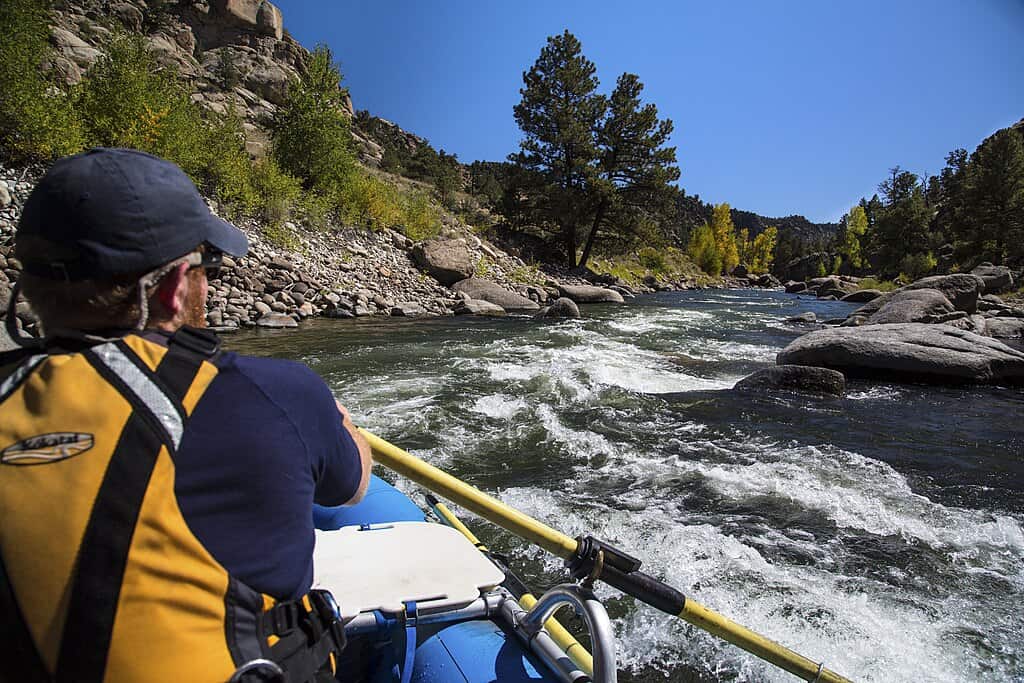Report: Effort to legislate ‘Right to Float’ likely to create more problems
There’s no denying the importance of outdoor recreation for Colorado.
In 2023, the industry contributed $36.5 billion to Colorado’s gross domestic product and supported more than 400,000 jobs. That year, outdoor recreation created $11.2 billion in local, state and federal tax revenue.
Nearly three decades earlier, voters created Great Outdoors Colorado to support the industry and recreation opportunities for Coloradans – largely through the state’s lottery resources – and since then residents in every county have benefited from a share of $1.6 billion in funding.
And so, when the “right to float” is considered on rivers, streams and other waterways in the state, the outdoors industry takes great interest. But, so do landowners and producers related to the agricultural industry, employing 195,000 Coloradans and contributing $47 billion in annual economic impact.
The “right to float” is at the center of a study recently released by Common Sense Institute, considering a variety of history and policy on the subject and in anticipation of potential legislation in the second session of Colorado’s 75th General Assembly in 2026.
“While the state’s system is imperfect, it remains a workable balance that protects private property rights, while sustaining one of Colorado’s largest economic sectors,” wrote Common Sense’s Director of Communications DJ Summers in a statement.
The report by Common Sense’s Outdoors Recreation Fellows Mike King and Greg Walcher, and with Common Sense’s Cole Anderson, reviews the complexities of the public accessing rivers and streams that cross private property.
In order to understand the issue at the center of the report, it is important to understand a difference in Colorado law. In other states in the West, an angler may fish a stream as long as the angler does not leave the stream – this was a subject in one episode of the TV show “Yellowstone” involving property owner Beth Dutton and an angler. In Colorado, “the land under the water – the streambed – belongs to the adjacent landowner,” the report reads. “Water belongs to the public, but not the land under it. Thus, wading on private property, as well as anchoring or otherwise touching the bottom, and portaging around obstructions, is trespassing.”
It still leaves unsettled whether someone could float through private property without trespassing, if the person never left the water or waded in the water.
“There is often private property under or adjacent to the water,” the report reads. “Nevertheless, rafting, kayaking and canoeing are multi billion-dollar businesses in Colorado.”
The report identifies a couple of Gunnison cases in which ranchers attempted to claim private property rights by implementing fence signage at river crossings, while rafting companies organized floats through those properties to encourage the state to settle the “right to float”. These and other issues were either resolved among the parties or through mediation, the report reads.
Among the issues the state would face with the implementation of a “right to float” law, according to the study, is the potential for costly landowner taking claims. The state’s constitution would require compensation if taking claims could be proven by landowners adversely affected by new legislation. Various solutions of proposed legislation, ballot initiatives and litigation have never stopped, the report reads, but still the case-by-case mediation has continued.
Common Sense suggests policy which would direct Colorado Parks & Wildlife to work with local governments for angler and floater education on existing status, while educating landowners on the trespass law with preference toward utilizing law enforcement. The report also encourages improved public information on investments being made toward stream and river access and for the CPW to annually publish such information.
“It may not be especially satisfying to conclude that addressing this particular issue through legislation, ballot initiatives or lawsuits might only make it worse,” the report reads. “But because of Colorado’s unique history, culture and circumstances, that is sometimes the right conclusion.”
“…anglers and floaters currently have some carefully defined access rights, and private property owners have some protection of their underlying and adjacent property. But as shown in this report, attempts by either side to expand those rights at the expense of the other are likely to create more problems than they solve.”
The Colorado Department of Agriculture declined to comment for this report. The Colorado Cattle Association and the Colorado Outdoor Recreation Industry Office did not immediately respond to requests for comment. The Club 20 Foundation will continue to monitor potential legislation and report upon developments related to the “right to float”.
Read the full report at Common Sense Institute.
Photo credit: Bob Wick, BLM, via CC-by-2.0

